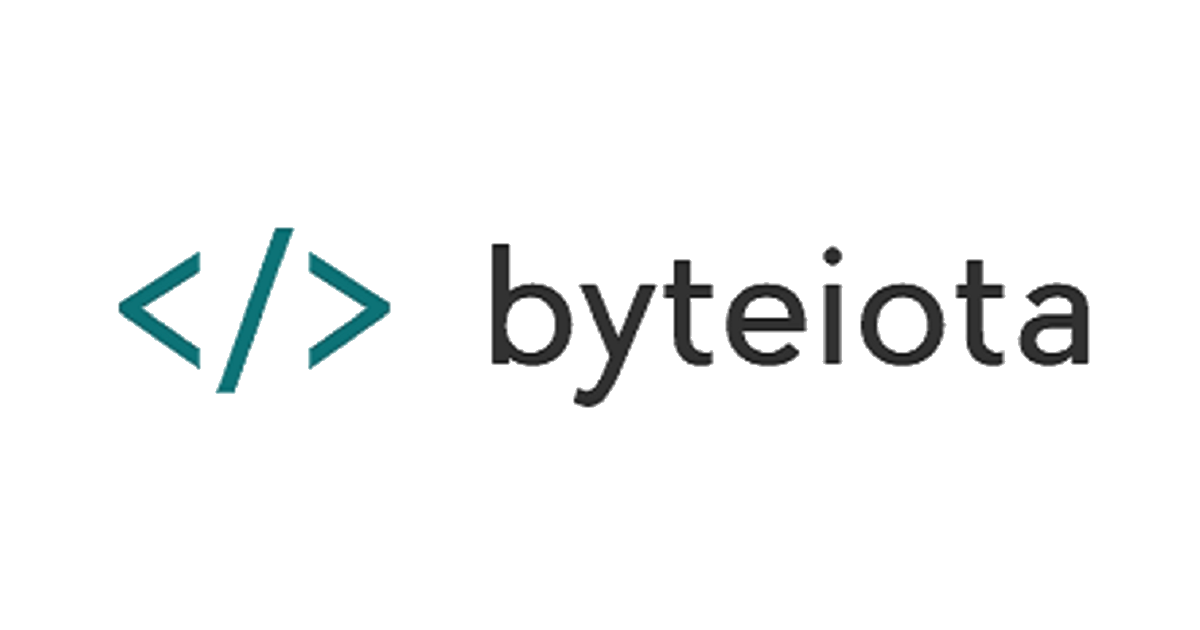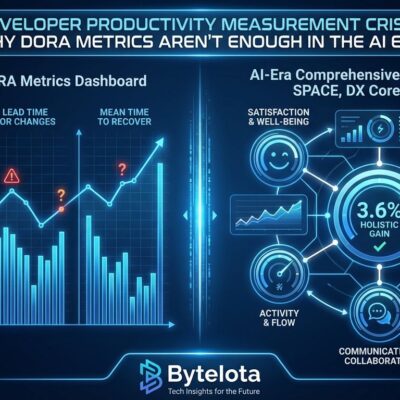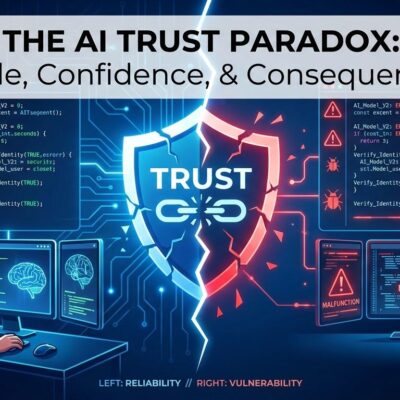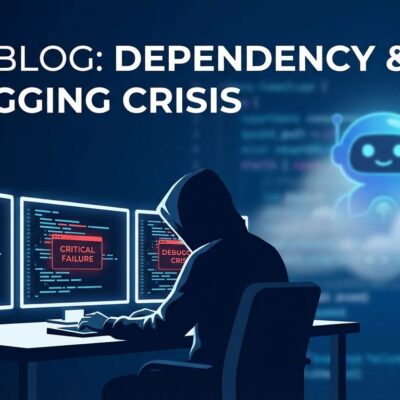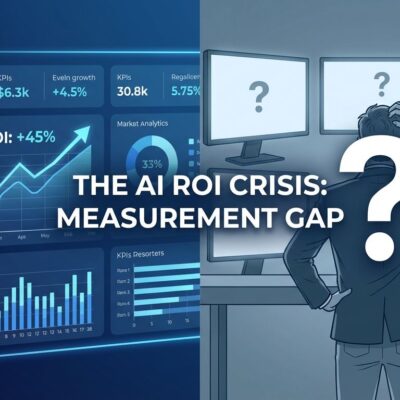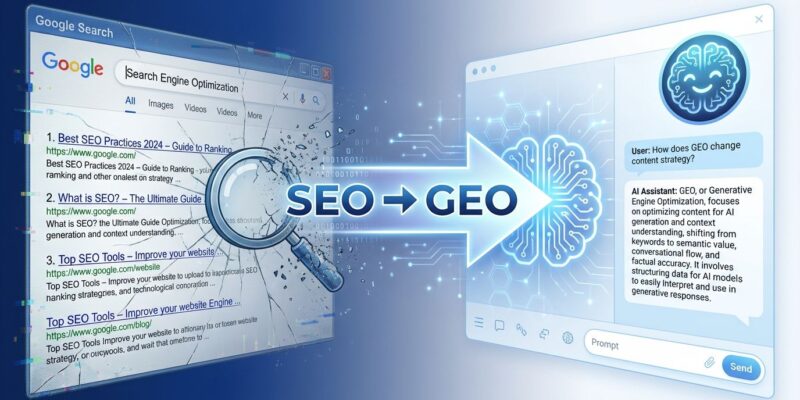
The $80 billion SEO industry just cracked. AI search traffic exploded 527% year-over-year between January and May 2025, while traditional search engines flatlined. Semrush predicts LLM traffic will overtake Google by the end of 2027. ChatGPT, Perplexity, Gemini, and Claude are now the gatekeepers of content discovery—and if you’re still optimizing for Google’s dying algorithm, you’re already invisible.
This isn’t evolution. It’s revolution. Welcome to Generative Engine Optimization (GEO).
SEO is Dead. Long Live GEO.
Traditional SEO was built on links, backlinks, and PageRank. You stuffed keywords into meta tags, chased domain authority scores, and gamed Google’s algorithm to rank #1. That playbook is obsolete.
GEO is built on language models. Success isn’t measured by where you rank in search results—it’s measured by whether AI engines cite your content when answering questions. The metrics that matter now: citation frequency, reference rates, brand mentions in AI-generated responses. Not click-through rates. Not page rankings. Citations.
The numbers don’t lie. AI-driven traffic to retail sites jumped 4,700% year-over-year by July 2025. ChatGPT processes 37.5 million prompts daily—and users behave completely differently. They ask 23-word conversational questions (not 4-word keyword queries). They spend 6 minutes engaging with synthesized answers (not seconds scanning link lists). They get zero-click experiences where AI provides the answer directly, with citations to sources it trusts.
Traditional search volume is predicted to drop 25% by 2026 and 50% by 2028. Google knows this—that’s why they launched AI Overviews. But by then, the game will already be over for companies clinging to old tactics.
Your SEO Tactics Are Making You Invisible
Here’s the controversial truth most “SEO experts” won’t tell you: traditional optimization tactics don’t just fail in the GEO era—they actively hurt your performance.
Keyword stuffing? LLMs ignore it. They prefer natural, conversational language. Cramming “best SaaS platform” into every paragraph makes you sound like a robot. AI models skip past that noise to find content that actually answers questions.
Backlink building games? AI doesn’t see links the way Google does. Yes, backlinks help with discovery, but LLMs prioritize content quality and authority signals over link count. You’re optimizing for a metric that doesn’t matter anymore.
Corporate jargon and marketing speak? ChatGPT cites Wikipedia 47.9% of the time because Wikipedia sounds like a human wrote it, not a committee of brand managers. If your content reads like a press release, AI will ignore it.
The SEO playbook changed in 2023 when Princeton researchers invented GEO. Most companies haven’t noticed yet. That’s your competitive advantage—if you move now.
Platform Differences Matter (And Wikipedia Beats Your Website)
ChatGPT, Perplexity, Gemini, and Claude cite completely different sources. One optimization strategy won’t cut it anymore.
A study analyzing 30 million citations between August 2024 and June 2025 revealed stark differences. Perplexity averages 6.61 citations per response, with Reddit accounting for 46.7% of its top sources. Gemini also leans heavily on Reddit, along with Medium and YouTube. ChatGPT only averages 2.62 citations per response—and Wikipedia dominates at 47.9% of its top 10 sources.
Let that sink in. If you’re trying to rank on ChatGPT, Wikipedia citations outnumber your corporate blog by orders of magnitude. Reddit and community discussions dominate Perplexity and Gemini. Your beautifully designed landing page with stock photos? Not even in the top 100.
What does this mean practically?
For ChatGPT, write Wikipedia-style content: comprehensive, neutral, well-sourced. For Perplexity, get active on Reddit, create fresh and timely content, and rank well on Bing (Perplexity uses Bing for source discovery). For Gemini, optimize your Google My Business profile and leverage YouTube. For Claude, focus on analytical depth and balanced perspectives.
Test your brand across all four platforms with 10 relevant queries each. Where are you cited? Where do competitors beat you? Tailor your strategy per platform, because one-size-fits-all is dead.
Princeton’s Top 3 GEO Methods: 30-40% Boost With Minimal Effort
Princeton University researchers tested nine GEO optimization methods across diverse domains. Three strategies worked universally across all site types, delivering 30-40% visibility boosts with minimal content changes.
1. Cite Sources. Add relevant citations from credible sources to support your claims. AI engines prioritize cite-worthy, well-sourced content. Link to research papers, industry reports, official documentation. This isn’t about SEO backlinks—it’s about being the kind of content AI trusts enough to reference.
2. Add Statistics. Replace qualitative fluff with quantitative facts. Instead of “AI search is growing rapidly,” write “AI search traffic increased 527% year-over-year.” Numbers signal credibility and specificity. They’re cite-worthy.
3. Incorporate Quotations. Quote industry experts, researchers, official statements. Expert voices are authority signals for AI models. When A16z says “the foundation of the $80 billion+ SEO market just cracked,” that’s a citation magnet.
These three methods require almost no technical work. You’re not rewriting your entire site—you’re adding citations, statistics, and expert quotes to existing content. And the results are real. A Contently client’s AI search channel generated 32% of their total sales-qualified leads within six weeks after implementing GEO strategies. Previously, that channel was dormant.
The other six methods (authoritative tone, simplified language, fluency optimization) are domain-dependent. But these top three? Universal.
Technical Implementation: Schema, Structure, Community
Let’s talk code. “Replace anonymous <div> soup with explicit HTML5 elements, then attach structured data they can parse in a single pass.” Even small schema errors can prevent AI from parsing your content.
Priority one: Schema markup. FAQPage schema is critical—AI models excel at extracting question-answer pairs. Add Organization schema with your name, logo, and social profiles. Product schema with pricing, reviews, availability. Article schema with author, publish date, headline. Use Google’s Structured Data Helper and Rich Results Test. Fix every validation error, because AI won’t overlook them.
Priority two: Content structure. Use question-based H2 and H3 headings. “What is generative engine optimization?” Answer immediately in the first paragraph under that heading. No fluff, no preamble—just the answer. Then elaborate. Write in natural, conversational language. Avoid corporate jargon. Use bullet lists. Keep paragraphs concise. All critical content should be in plain HTML text, not JavaScript-hidden or image-based.
Priority three: Community engagement. This is non-negotiable. Reddit isn’t just a discussion forum anymore—it’s a primary source for Perplexity (46.7% of top citations) and Gemini. Provide genuine, helpful answers in relevant subreddits. Build karma naturally. Get upvoted, because upvoted content feeds training data.
Encourage reviews on Google My Business, Yelp, G2, Capterra. AI platforms cite review sites heavily. Claim profiles on industry directories. Ensure consistent NAP (Name, Address, Phone) across all platforms. Get included in “best of” listicles and comparison pages—those are citation goldmines.
And measure everything. Track AI referral traffic in GA4 with custom channel groupings. Manually test 10 queries across ChatGPT, Perplexity, Gemini, Claude. Use tools like Otterly.AI, HubSpot AI Search Grader, or ReachLLM to monitor citation frequency, reference rates, and narrative accuracy. Not CTR. Not page rank. Citations.
Adapt or Die
The tipping point is 2027. That’s when LLM traffic is projected to overtake Google search. Companies that master GEO now—before the inflection point—will dominate content discovery for the next decade. Those still running 2020 SEO playbooks will wonder where their traffic went.
Your choice is simple. Keep optimizing for Google’s dying algorithm, or prepare for the GEO era. Test your brand across AI platforms. Add citations, statistics, and expert quotes. Fix your schema markup. Get active on Reddit. Start measuring AI citations.
The $80 billion SEO industry is scrambling to reinvent itself. Most “experts” are obsolete. But the developers and technical teams who understand how LLMs actually work? They’re already winning.
Don’t wait until 2027. The revolution is happening now.
